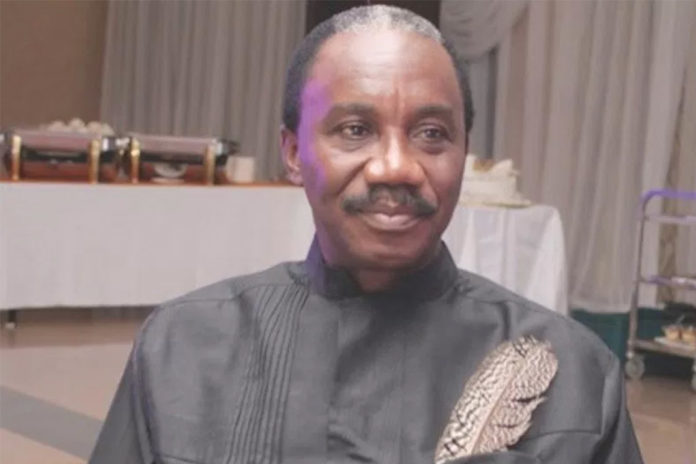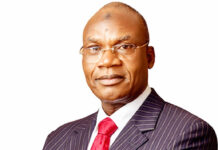Ernest Ojukwu, a senior advocate, has been in practice of law for over three decades. Ojukwu, as a law teacher for 32 years, professional instructor on continuing legal education for the bar and a legal practitioner has impacted greatly on the development of law and justice delivery system. In this interview, he spoke on legal education in Nigeria, roles of the senior members of the Bar in sanitizing the legal system and the planned sale of public assets. Excerpts:
You were a Deputy Director-General of the Nigerian Law School and head of the Augustine Nnamani Campus, Enugu for some years. What was the experience like?
I was head of the Law School Campus for 12 years. And I was the pioneer head. So I started working at the Law School without a single chair or table on 12th February 2001. The first meeting with my staff was held on the balcony of a building without a single chair or table. My first desk top computer for the Campus was a donation by Chief O.C.J. Okocha, SAN, the then President Nigerian Bar Association, NBA. The Campus was over grown with weeds and snakes and scorpions were in charge. The school was not fenced round. We didn’t have culverts for channeling water. The roofs of most buildings leaked water. We had little or nothing to run a law school. It was a very difficult and challenging time but my first set of students treated me as a brother and partner and we all went through difficult times together. They were quite understanding and cooperative. When we stabilized many years later, my focus shifted to my original single mission- change, what and how we taught at the Nigerian Law School. The then Director-General, Prof Tahir Mamman, SAN gave me the free hand and support to lead the academic change at the Nigerian Law School from 2006. It was very exciting for me to witness the adoption of the first ever Nigerian Law School Curriculum in 2008 and the beginning of outcomes based on interactive and experiential learning.
With your experiences at the Law School, do you share the belief and argument that the standard among lawyers has gone down?
My view here is based on my combined experience as a law teacher for 32 years- University, Law School and Professional Continuing Legal Education for the bar and as a legal practitioner. There is a major challenge to the educational standard, professionalism, competence and values at the Bar today.
Law students of Open University of Nigeria have been denied enrollment into the Nigerian Law School by the Council of Legal Education. Is the denial justified?
A couple of years ago the Council of Legal Education decided that it will not admit graduates of Open Universities, part time and online programmes. So the Nigerian Law School must be acting under the authority of the decision of the Council of Legal Education. The Council is made up of the Heads of Law Faculties, Attorneys-General of States, representatives of the Attorney-General of the Federation and Representatives of the Nigerian Bar Association including the President and Secretary.
The reasons notwithstanding, in England where we copied our legal system and jurisprudence from, people still read law part-time and most of those trying to shut Open University law graduates out of the Law School today benefited from such liberal Law School policies of other developed countries. Why does it appear we like making things difficult for our people?
I do not think that the Council set out to make things difficult for anybody. Check the history of legal education in the United Kingdom; it did not start accepting everything in one swoop. Things evolved as they developed and understood how to maintain their standards. There is a major challenge with our full-time legal education programmes on adequate staffing, quality staffing, ethical issues and malpractices, teaching methodology including the use of students-centered learning and experiential education. If these foundational problems are what we are still grappling with in our full-time programmes, what do you think will be happening with distant education? Law is not under subscribed. It is actually over-subscribed in Nigeria. So we do not need any affirmative lower quality programmes of action to make up. There are 55 approved full-time law faculties that will soon be producing a total of about 10,000 lawyers per annum. Why don’t they have Medicine, Civil Engineering, and airplane flying in the Open University?
Law studies in England and other developed societies are between two and four years, though in the United States, it’s a post graduate study, but in Nigeria, it was increased to five years. What is the rationale considering the delay in our university system due to incessant strikes?
The five year-programme was introduced in 1990 to prepare our students more adequately for the rigors of the profession. It was also a decision to marry the demand for law to be a post graduate programme and the demand that our law graduates get more matured within the training period. Right now the average age of first year law students in Nigeria is 15-17 years. The only problem I have with the length of the LLB is that at present we are wasting that time. The LLB programme is not generally being delivered in a way to effectively build skilled and competent lawyers who are conscious of social justice and ethical values. The curriculum and teaching methodology is still in the main traditional and hollow. So the five years is not achieving its purpose. Our lawyers called to the bar on day one can hardly stand and walk.
As a senior member of the Bar, how do you think the Nigerian judiciary can be truly made independent?
Allow the Judiciary manage its own funds at all levels. But to do this, we need to agree with the Judiciary on our definition of independent management of finances. We must agree on ground rules and application of open and transparent accountability and fiscal responsibility. We must agree on what should or should not be financial frivolities like the many frivolous retreats and training programmes some of our Judiciaries embark on abroad. We need to find a way to deal with the malpractice of appointing the wrong persons as judges. We need to pay Judges very well not the peanuts they presently receive. We need to change the present massive corrupt culture pervading the entire segments of the judiciary support staff and personnel.
Will you say the Legal Practitioners’ Disciplinary Committee, LPDC, is doing enough to sanitise the Bar, considering the numbers of senior advocates answering criminal charges in court?
It must surely be doing enough within its capacity. It is not the job of the LPDC to bring offenders before it. The LPDC by the traditions we have established just have to wait until a petition is brought before it. It does not investigate or charge. So its work is limited to cases brought by the Bar before it. And the LPDC is only one panel that sits at Abuja for the whole country. So it cannot do much. This is why some of us proposed many years ago an amendment to the Legal Practitioners Act to make it possible for many LPDC’s to be set up at the same time and for the establishment of a Legal Services Commission. If nobody sends a petition to the LPDC and if the leadership of the Bar does not frame a charge before the LPDC, the LPDC cannot do anything against any lawyer no matter how grave his conduct may be. With a Legal Services Commission, the Commission is empowered to investigate/report/prosecute disciplinary cases whether or not a formal petition or complaint has been made. This is how other jurisdictions have been able to stem the tide of indiscipline, corruption and unethical conduct by the legal profession. If you pick up the Nigerian Law Reports for example, you will see litany of cases where lawyers were indicted by courts and because no person formally took those matters up in petitions to the Disciplinary Committee, those cases have remained un-investigated till date.
The Federal government hinted of its plan to sell some national assets to fund the 2018 budget. What is your reaction to this and what does it portend for the country?
I have no problem with the sale of some national assets as long as the process is open and transparent. There are many so-called national assets that actually need to be sold like, the National Stadium at Lagos, and the National Theater at Iganmu. These are wasteful and shameful national assets.

















The decision by the Federal Government to sale wasteful or wasting national asset is justify expect that the proceeds and process should be well guaranteed to purposefully touch on the lives of Nigerians.
However, my fears is that under the current administration, there is no geographical spread or even handedness or fairplay in distribution of both appointment and infrastructure under this government.
Hence, one suspects that the process and proceeds shall go the way other policies and infrastructural development under this government has been going will also go. Thereby encouraging further nepotism with it.